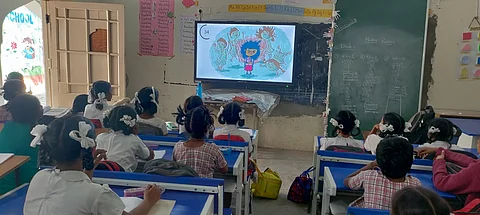

When I first spotted the Teach for India (TFI) fellowship advertisement in 2015, fresh out of postgraduation (PG), my heart raced with excitement. The opportunity to teach underprivileged children in government schools, despite the modest salary, seemed like the perfect gateway into education — even without a BEd or teaching experience.
But when I approached my father with this dream (yes, parental approval for major life decisions was very much a thing a decade ago), he gently steered me toward a more conventional path of science and research. Reluctantly, I deleted my half-completed TFI application and tucked away my teaching aspirations.
For three years, I worked at the research facility, but I couldn't shake the feeling that I was meant for something else, though the fear of shifting away from this secure path kept me frozen in place. Then came the most unexpected catalyst for change — I became a mother.
My daughter's arrival transformed everything. Looking into her eyes, I discovered a courage I never knew I possessed. When I saw the TFI ad on Instagram this time, (how times have changed!) the statistics about educational inequality in India that once seemed like mere numbers now felt personal — each figure represented a child, someone's daughter, or son.
So, I joined the fellowship, and what followed was a journey that taught me more than any degree could have.
I entered the education sector with my own set of assumptions about how schools should work, but each day taught me something new about teaching, about children, and about myself.
I had initially approached teaching with a rigid mindset, believing that, like motherhood, it required maintaining strict boundaries — a teacher couldn't be a friend, just as a mother couldn't be one. But six months into my journey, I realised I had it wrong.
The beauty of education lies in its flexibility to be many things at once. You can guide and nurture while also connecting and sharing joy with your students.
My student Navya's story, is one of many others that taught me profound lessons, that I carry with me forever. She was an 11-year-old studying in Class III because her family wouldn't allow girls to study, but her mother fought with her in-laws and made sure Navya was sent to school every day.
One day her mother came crying to me and said, "I'm scared that my daughter won't share anything with me because of all the chaos that happens at home." She shared her issues and asked if I could do something to help her understand why her daughter was always quiet at home.
I figured I needed to show Navya that she needed to learn how to identify her emotions and healthy ways to deal with them. I sat with Navya and explained how keeping our struggles to ourselves only makes the pain last longer.
Navya lifted her head and said, "Didi, I know the fights that happen at home are because of me. I know my mother is struggling for me, but I also know that I don't want to stop coming to school, even if it means my mother has to bear this. Sometimes I feel my thinking is selfish, but I think I still want to choose to be like this anyway. That's why I don't want to talk about it to my mother."
These words of internal struggle and her decision to stay quiet made me realize how surface-level my own thinking was. How did I just assume she was not aware of feelings? She was capable enough to understand a complex dilemma; she was okay choosing something for herself, yet she was empathetic enough not to show that to her mother.
I would never have imagined such emotional maturity in an 11-year-old girl if I had not witnessed it myself.
After two years, what started as a leap of faith, driven by my desire to teach, became a longing to be part of something bigger than myself. I wanted to stay as an educator, a role that would let me feel the joy I felt when my students read a complete sentence for the first time.
I wanted to be in a place that would continue to break my biases and prejudices toward people living in the ground reality, just as Navya did with her emotional maturity.
Today, when I watch my former students succeed in anything, I feel a pride that transcends personal achievement. It's the quiet satisfaction of knowing that somewhere in their journey, I played a small but meaningful part. This, I've learned, is the true reward of choosing education as a second career — it's never too late to make a difference.
(Sravya Panangipalli is a Teach For India Fellow from the Cohort of 2021. She currently works as an Instructional Designer at Inquilab Inventions Foundation, Hyderabad, an NGO that works on building real world problem-solving and critical thinking skills in students.)
